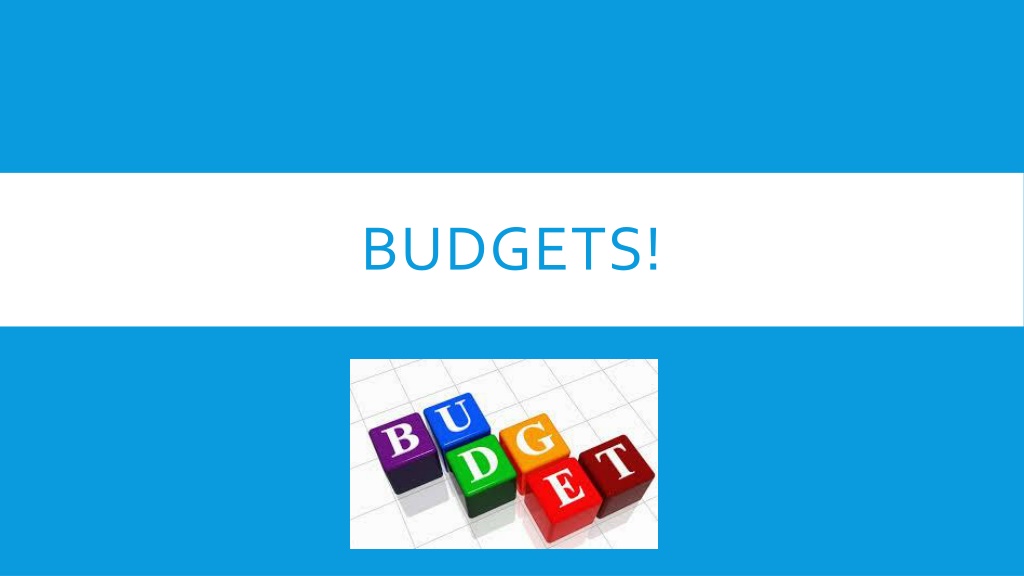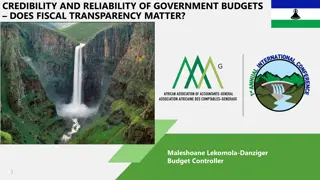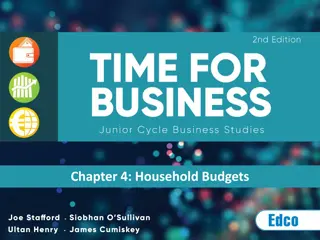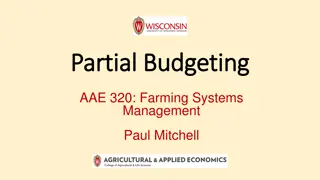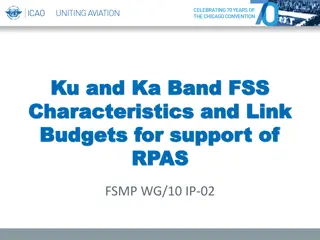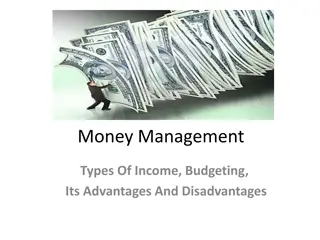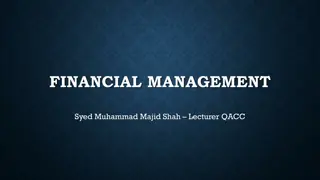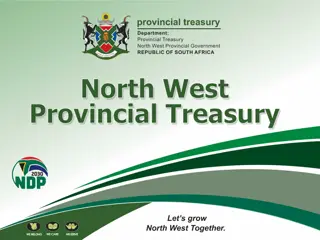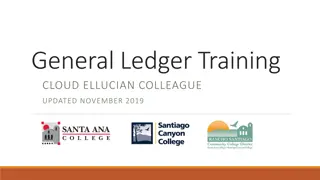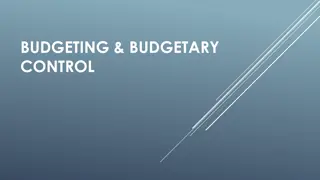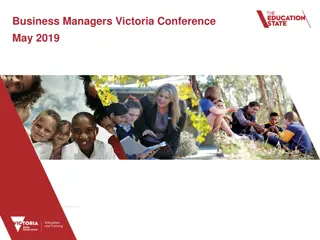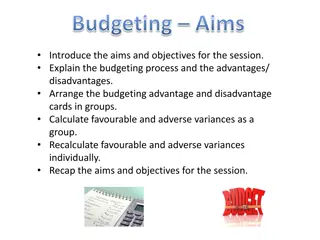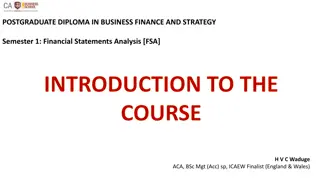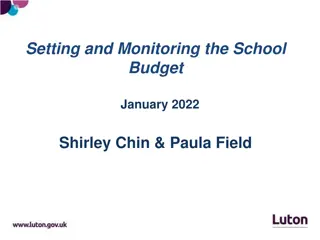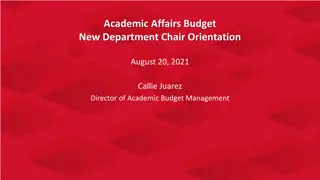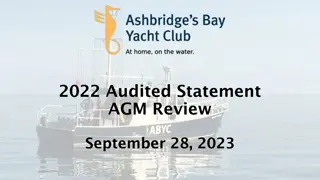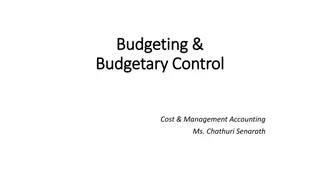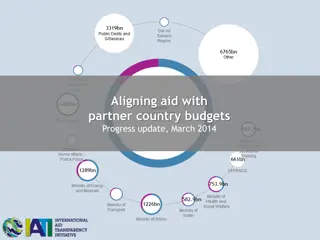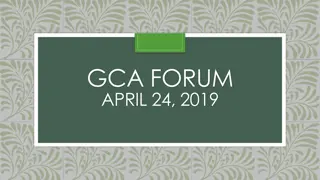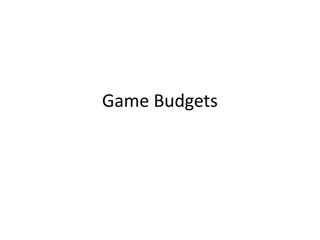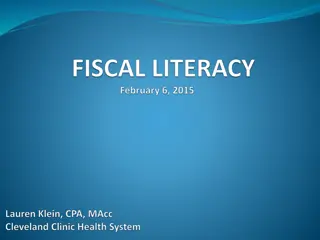Understanding Budgets: A Guide to Financial Management
A budget is a crucial tool for managing income and expenditure effectively. Learn how to create and maintain a budget, understand different types of income and expenditure, and strategies for dealing with deficits or surpluses. Explore the concept of net cash, opening cash, and closing cash in budgeting. Stay informed about the impact of changes like the introduction of water charges on household budgets.
Download Presentation

Please find below an Image/Link to download the presentation.
The content on the website is provided AS IS for your information and personal use only. It may not be sold, licensed, or shared on other websites without obtaining consent from the author. Download presentation by click this link. If you encounter any issues during the download, it is possible that the publisher has removed the file from their server.
E N D
Presentation Transcript
WHAT IS A BUDGET ANYWAY? A budget is a record of our planned income and our planned expenditure. It is a good way to see if we will have enough money throughout the month for our discretionary treats! A budget helps us to see how much money we receive and it helps make sure we don t spend more than we earn.
INCOME We record our income at the top of a budget. Like This There are many different type of income, such as Wages Pension Child Benefit Only add money you know you will receive to the table. This will make for a more accurate budget! We receive our money on a pay slip
EXPENDITURE Fixed- This is spending the same amount on a particular thing at a certain time such as every year/month. You MUST pay this!! E.g. Mortgage, Television Licence Irregular- This is spending a varied amount on goods and services. It is called irregular because the amount varies each month, e.g. your electricity bill will increase in amount during the winter months. You also have to pay this. Discretionary- This is spending money on goods we want but do not need. We should only buy these goods if we have money left over at the end of the month. We record our expenditure directly under our Total income like this
IS YOUR BUDGET A SURPLUS OR DEFICIT??? Deficit Ways to deal with a deficit budget! Cut down on discretionary expenditure- such as, holidays, new clothes, presents etc. Shop around for cheaper purchases . E.g. cheaper brands of food Spread bills out over the year so that you don t have to pay the full amount altogether and therefore you will be able to pay for necessary items monthly Surplus If your planned income is less than your planned expenditure. If your planned income is more than your planned expenditure. Deficit Surplus Expenditure Income Income Expenditure
NET CASH, OPENING CASH, CLOSING CASH Net cash is produced when we take the total expenditure away from the total income. This is the amount of money we have left over after all deductions(PAYE, USC, PRSI) are taken out and all of our expenditure is subtracted. This is the money we are left with. Opening cash is the money left over from the previous month. You bring forward the closing cash from the month before to get your opening cash Closing cash is Net Cash + Opening Cash. This is the money you have left over at the end of preparing your budget.
BUDGET 2015 In the 2015 Budget, the water charge was introduced. This will have a massive change in peoples monthly household budgets. This will increase the odds of people having a low amount of money at the end of the month or even worse, left with a deficit at the end of the month. In 2014, statistics showed that people where spending more money on housing (rent or mortgage repayments which have increased from come 12% to 18.2%) instead of food ( which has dropped to 16.2%). Also there has been a sharp increase in fuel and light due to increased energy prices. The average weekly expenditure is 35.35, an increase of 15.3 % The amount spent on alcohol and cigarettes has fell by more than 16%. Transport decreased by 5%.
2015 IMPACTS In 2015 the biggest impacts to household budgets show the cost of housing and rent to be on the increase while energy costs are showing a large reduction. Two major impacts in household budgets is the increased costs of mortgages/rent, driven by the combination of LPT (Local Property Tax) and Water Charges. The second major change is more positive, this is driven by a reduction in fuel and energy. Unfortunately the cost savings in fuel and energy are less than the increase in mortgage and rent.
FUTURE IMPACTS Future household budgets appear to be on the increase again due to several factors. The factor of income will also be required to increase to meet increase costs. As Ireland s Economy recovers household budgets will drive the need for increased wages.
O'Callaghan Family Planned Income Salary - Mark Salary - Sally Total Income Planned Expenditure Fixed House Mortgage Car Insurance TV Licence Subtotal Irregular Groceries Telephone Motor Expenses Subtotal Discretionary Entertainment Holiday Subtotal Total Expenditure Net Cash Opening Cash Closing Cash July August Sept October Total 1700 1700 1700 1700 6800 A Budget! 1350 1350 1350 1350 5400 3050 3050 3050 3050 12200 650 650 650 650 2600 450 450 108 108 1100 758 650 650 3158 This is what a budget looks like! Can you see where the net cash, opening cash and closing cash are placed? 350 350 350 350 1400 100 150 250 65 65 185 65 380 515 415 685 415 2030 80 80 80 80 320 1800 1800 80 1880 80 80 2120 1695 3053 1415 1145 7308 1355 -3 1635 1905 4892 200 1555 1552 3187 200 1555 1552 3187 5092 5092
THANKS FOR WATCHING Now you re able to create your own budget! We hope you enjoyed our presentation and trust that you now have a clear understanding for Budgets. By Sinead Donavan and Rachael Hughes
